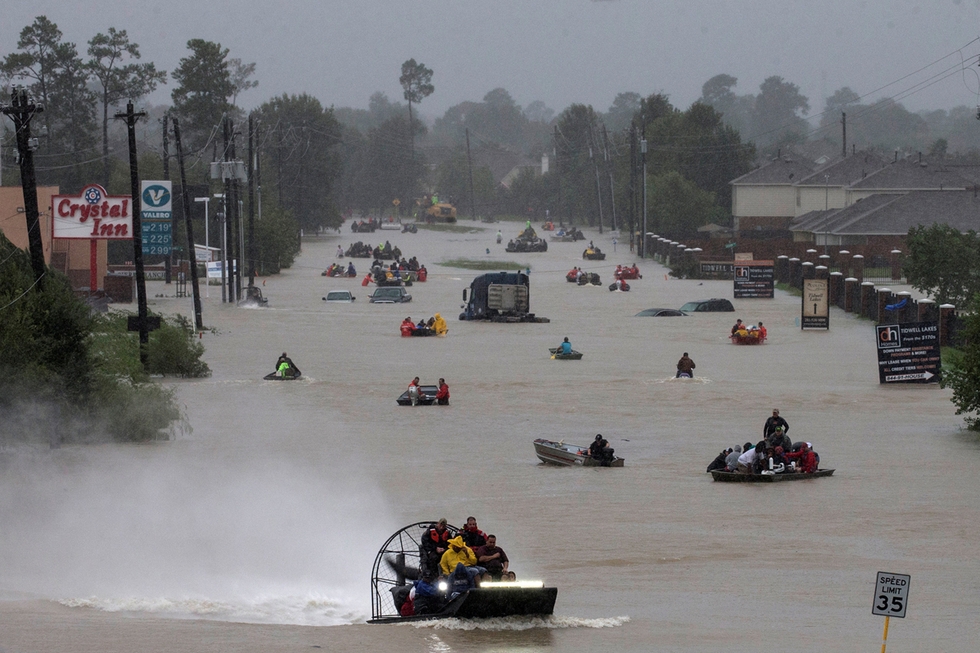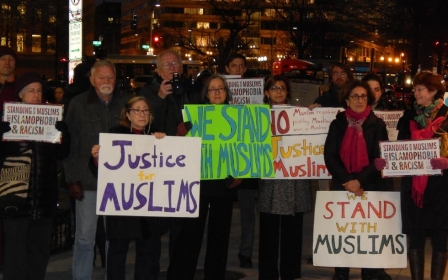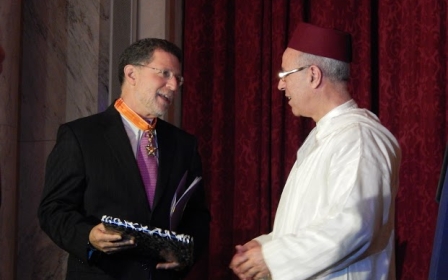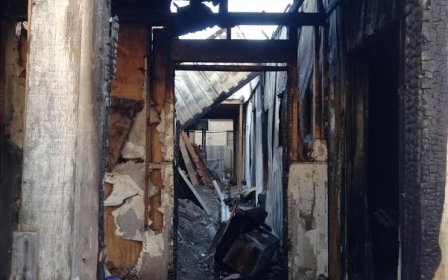Texas Muslims come to the aid of Harvey victims

Houston’s Muslim community is at the forefront of helping those affected by Tropical Storm Harvey, which has flooded much of the fourth most populous city in the United States.
Dozens of mosques have either opened their doors for shelter, aided in rescue operations or provided goods, such as food, blankets and bottled water for those in need.
“In the whole Greater Houston area, people are helping people; neighbours are helping neighbours and we are trying everything we can to help people,” said MJ Khan, the president of the Islamic Society of Greater Houston.
“We are required – it is an obligation for Muslims – to help our fellow human beings regardless of whether they are Muslims or non-Muslims,” he told Middle East Eye on Tuesday.
Tropical Storm Harvey has battered the southeast Texas city with torrential rainfall, with some places receiving more than 50 inches of rain. It has killed at least 11 people, but officials warn that the death toll may increase once flooding subsides.
It landed as a category 4 hurricane and slowly moved up the Texas coast, dumping historic amounts of rainfall as it inched towards Houston.
“We knew that this situation was going to be terrible but it turned out to be worse than terrible,” Khan told Middle East Eye.
But Khan added that the Islamic Society of Greater Houston, a network of 21 mosques, said they were prepared to provide relief efforts.
“We have a communication system – through internet and instant messaging and good old fashion phone calls – to figure out which mosques are able to accommodate people and we left it to the local community – those mosques – to decide. We probably have about seven to eight mosques agree to accommodate people,” he said.
“When it started raining, we used our communication system and asked people who live close to the mosques - within walking distance - for volunteers and supplies. Even though the stores are closed, people brought in whatever they had from their home,” he added.
Khan said that each mosque is sheltering “from at least a few dozen to more than 100 people” - a total of 400-500 people, where many of them are elderly or small children. The Islamic Society of Greater Houston also has a network of 150 volunteers aiding in relief all around the city, including the George R Brown Convention Center, which is housing several thousand people.
In addition, the mosques are a staging ground for first responders and rescue operations for people stranded by flooding.
For example, in the Stafford area, which is located in southwest Houston, authorities set up a mandatory evacuation alert because of emergency flooding, but the Masjid Sabireen mosque is located just a few blocks outside the evacuation zone.
“Our volunteers there got together with the first responders to rescue people. Since 911 was inundated and were only dealing with life threatening situations, our volunteers knew where people were stranded, boated into their homes and brought them to the mosque,” Khan told Middle East Eye.
Houston’s large Muslim community has an abundance of doctors who have volunteered to provide around-the-clock medical assistance as well.
In Clear Lake, a suburb in southeast Houston that was one of the hardest hit areas with over 40 inches of rain, the Islamic centre there set up a 24-hour hotline with a doctor in the area for medical emergencies, said Dr Waleed Basyouni, the imam at Clear Lake Islamic Center.
They also have volunteers bringing in blankets, clothes and pillows and are coordinating with a nearby Unitarian Universalist church about rebuild efforts, Basyouni told MEE.
Khan added that the interfaith community has been actively cooperating in relief efforts.
“We have a very strong interfaith group in Houston. We are apart of interfaith ministries of greater Houston and all of us joined together in this effort. We are in constant communication and we got calls from the mayor’s office on what is needed and not needed,” Khan told MEE.
In fact, Khan said the city of Houston has been actively listening to the faith community about what needs to be done.
He cited an incident where a member of the Muslim community in the Houston suburb of Cypress called him, noting that a government-operated community centre can serve as a shelter in the area because it is on higher ground.
Khan called a county judge who worked to open the building for evacuees within two hours.
“I only knew when FEMA people started calling me to express thanks. We have a great network of reaching out to officials and it’s amazing to see our leaders – mayors, judges, police chiefs, sheriffs, you name it – responding to this terrible situation so quickly,” he told MEE.
Despite the devastating impact of the storm, Houston’s Muslims expressed a strong faith in the city’s ability to recover from the natural disaster.
“When the rain intermittently cleared, everybody wandered outside and asked each other if everything was okay and if they needed anything. What I saw was inspiring,” said Basyouni.
New MEE newsletter: Jerusalem Dispatch
Sign up to get the latest insights and analysis on Israel-Palestine, alongside Turkey Unpacked and other MEE newsletters
Middle East Eye delivers independent and unrivalled coverage and analysis of the Middle East, North Africa and beyond. To learn more about republishing this content and the associated fees, please fill out this form. More about MEE can be found here.




